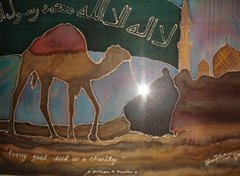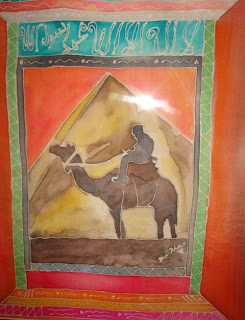
Hadith-35
Abu Hurairah, radiyallahu 'anhu, reported that the Messenger of Allah, sallallahu 'alayhi wasallam, said:
"Do not be envious of one another; do not artificially inflate prices against one another; do not hate one another; do not shun one another; and do not undercut one another in business transactions; and be as fellow-brothers and servants of Allah.
A Muslim is the brother of a Muslim. He neither oppresses him nor humiliates him nor looks down upon him. Piety is here - and he pointed to his chest three times. It is evil enough for a Muslim to hold his brother Muslim in contempt. All things of a Muslim are inviolable for another Muslim: his blood, his property and his honour."
[Muslim]
Background
Unity is one of the greatest objectives of Islam. There are many verses in the Qur'an that urge Muslims to unite. In Surah al-'Imran, Ayah 103, Allah says:
And hold fast, all of you together, to the Rope of Allah (which is Islam) and be not divided among yourselves.
This is a very well-known verse to Muslims. In Surah al-Taubah, Ayah 71, Allah says:
The believing men and women are 'awliya' (loyal) to one another.
There are many other verses in the Qur'an that urge joining unity, as well as verses that forbid disunity. We can see this in the same Surah al-'Imran, Ayah 103, in which Allah says:
….and be not divided among yourselves.
So in the same verse the Muslims are asked to be united and prevented from disunity. The Qur'an contains many such verses, for example: Surah al-'Imran Ayah 105-107; Surah al-Hujurat Ayah 10; Surah al-An'am Ayah 153 and 159; and in Surah al-Rum Ayah 31-32. All of these verses and many others in the Qur'an forbid the division or split of the Muslim community.
Moreover, we have many hadiths that command the Muslims to be united. One hadith is recorded by Imam Muslim: "Verily Allah likes three things for you and disapproves three things for you: He is pleased with you but you worship Him and disassociate anything with him; that you hold fast to the Rope of Allah and not to be scattered (disunited); and He disapproves for you irrelevant talk, persistent questioning, and wasting of wealth."
We find that Islam commands the Muslims to practice things that will bring unity - there are conditions and actions where the Muslims need to perform to accomplish this. At the same time, we also find that there are many actions that Islam forbids because these actions may lead to the disunity of the Muslim ummah. This Hadith 35 falls in the latter category.
lessons
The first action that the hadith forbids is envy (al-hasad). Muslim scholars like Imam Ghazali and others define envy as disliking to see a person receiving a bounty and wishing that he or she (the receipient) would lose it.
Ibn Rajab gives a different and broader definition. He states in his definition that it is part of human nature that a person dislikes anyone to be better than him in virtues. He says that people differ in their attitudes and he lists five categories of envy that people have:
There are some people who will make the effort through action or speech to abolish the bounty received by someone whom they envy.
There are others who will then try to get that bounty transferred to them. So they firstly try to take it away from the person they envy and then they try to get it for themselves. For instance, if a certain person is offered a certain position or authority, the envious one will try to do something by hand or by speech to take away that position or authority from that person. Then he will try to get that status or position transferred to himself.
There are some people who do not make any effort by action or speech to harm the one whom they envy. Ibn Rajab says this category of people can be of two types:
The one who does his best to eliminate the feeling of envy within himself but he cannot overcome it. In spite of this, he keeps fighting and struggling against it. Ibn Rajab says this type of person is excused from punishment.
The one who thinks about envy and practices it again and again. He does not make any effort to fight it even though he does not do any harm by action or speech. But he actually enjoys and practices envy - he wishes that the bounty of the envied one will be lost. Consequently, this person is subject to punishment.
There are those who, whenever they envy someone, do not harm him or her. They do not even wish the loss of the bounty from the envied one. Instead, they make the effort to attain a similar bounty or virtue for themselves. Ibn Rajab says: "If this bounty is wordly virtues or worldly bounties, there is no benefit in that." For example, if you see someone who has a Mercedes, and you try to attain a similar car for yourself, then there is no benefit in that. But if it is a righteous virtue, then it is good.
There are some people who, whenever they feel envy, do their best to stop it and they will do a favour or something good for the person whom they envied. In addition, they will also make du'a for that person until they love him - because envy is usually associated with hatred. They will wish that the envied ones are better than them - they do not bother themselves if others have things which are better than what they have. Ibn Rajab says these people are the best category of true believers since everyone is subject to indulge or be trapped by envy or being envious of others.
Why is envy (hasad) forbidden?
It can cause - by the permission of Allah - harm to others whom are envied. Consequently, they are considered as evil acts in Islam. They can cause - even by just wishing - the harming of a person. It is the virtue of Shaitan. And it is also the virtue of Jews to envy other people. This is mentioned in Surah al-Baqarah, Ayah 109 and in Surah al-Nisa', Ayah 54.
The Prophet, sallallahu 'alayhi wasallam, warned Muslims against envy when he said "Creeping upon you is the diseases of those people before you: envy and hatred. And hatred is the thing that shapes. I do not say it shapes the hair but it shapes the religion. By the One in whose Hand is my soul, you will not enter paradise until you believe, and you will not believe until you love one another. Certainly, let me inform you of that which may establish such things: spread the greetings and peace among yourselves." [Recorded by Imam Ahmad and Al-Tirmidhi]
Since this is a harmful act, Muslims are asked to recite certain Qur'anic verses such as Surah al-Falaq, Surah an-Nas, and Surah al-Ikhlas to protect from envious people. According to the Muslim scholars, it would be preferable to recite them after the five prayers along with Ayat-ul-Kursi.
Al-Tanajush is translated literary as "do not artificially inflate the prices against one another". Najash that is mentioned in this hadith can be interpreted, according to Ibn Rajab, in two ways:
It can be interpreted as bai' al-najash - the trading where a person offers a high price for a certain item not for the sake of buying it but for the sake of raising the price of the item so that in the end it is sold for more than its actual price/worth. This is usually done, even in the Muslim world today, by a previous agreement by the salesman and another person or relative who pretends that he wants to buy. This is done in the stock market or auctions where there is a person who keeps bidding higher prices for an item. He is doing a favour for the person who wants to sell. This is considered as bai' al-najash. The majority of Muslim jurists (fuqaha) say it is valid. However, they say that if the buyer finds that he has been manipulated in a way where the price exceeded drastically over the actual price, then he has the choice of returning the item.
The second interpretation of najash is a broader one, more than merely limiting it to trading. Ibn Rajab says here it means any kind of deceiving actions that will lead to harming others. He adds that all dealings that are conducted in a deceiving way are included here. He quotes Surah Fatir, Ayah 43 : "That the evil plot encompasses only him who makes it."
Ibn Rajab says that this hadith is a warning to Muslims not to hate one another, especially if it is because of self-interest. Why? Because Muslims are brothers in Islam. They should love each other and should not hate one another. Consequently, al-nameemah, backbiting and slander are forbidden because they will lead to hatred among the Muslim community. Ibn Rajab says that when the Muslims started dividing into different sects because of conflicting views regarding certain religious matters, this led to disputes and hatred among the community, and thus disunity.
We should not turn our backs on one another. Ibn Rajab says this means any form of disassociation. He says that the Prophet, sallallahu 'alayhi wasallam, said the Muslim is not allowed to disassociate himself from the others for more than three days. This is, as Ibn Rajab points out, in worldly matters. Whereas in the religious matters, disassociation is one of the punishments that Islam allows - e.g. to disassociate with those who commit sins in order to teach them a lesson. But scholars say that if the person who commits the sin is not likely to come back to the right path, then it is meaningless to disassociate with him. As one of the scholars pointed out, if the objectives of Islam are not fulfilled then disassociation is meaningless.
We should not undercut one another in business transactions. For example, if someone is trying to buy something from a salesman, in the middle of their negotiations another salesman appears and interferes and tries to get that customer to buy his product/service instead. This kind of transaction is forbidden because the customer has yet to make his final decision - it will lead to the disunity of the Muslim community.
The Prophet, sallallahu 'alayhi wasallam, asks us to be brothers to one another. Ibn Rajab says this is like justifying the actions that are mentioned by the Prophet, sallallahu 'alayhi wasallam, because these evil acts will lead to spoiling the brotherhood of the Muslims. If Muslims avoid these evil acts, then this will lead them to be brothers. Moreover, Ibn Rajab says this statement implies that Muslims have to make the effort to do whatever that will lead to achieving this brotherhood. This means fulfilling all the obligations towards Muslims, for example like returning the greetings, visiting the sick, helping the needy, accepting invitations, sending presents, shaking hands, and smiling.
Then the Prophet, sallallahu 'alayhi wasallam, says the Muslim is the brother of another Muslim. Ibn Rajab explains about this statement: "It is now obligatory for each brother that he tries to benefit his Muslim brother and to refrain from harming them." He adds that the major harm is oppression and injustice. If a Muslim is in need of your support and you fail to support or help him, this is unjust. There are many places in the Muslim world where the Muslims are in great need of help. They are being oppressed and nobody supports them. Accordingly, if we are not doing anything to help them, we are failing our Muslim brothers. We need to be united to solve the problems that we are facing today. Our main concern should be the unity of the ummah. A contemporary scholar, Abdurrahman Al-S'adi, says that one of the greatest forms of jihad is to make an effort to unite the Muslims. He states that cooperation among Muslims is an obligation.
We should not lie to our Muslim brothers. We should also refrain ourselves from belittling or making fun of other Muslims. We should not make signals or gestures that threaten the face value of our Muslim brothers. We should take care not to be cynical to others and not to undermine other Muslims.
The Prophet, sallallahu 'alayhi wasallam, says taqwa is in the heart. Ibn Rajab comments on this statement saying it is evidence that the most noble among people are the ones who are righteous even if they are not lucky in the sight of other people. If they are righteous, they are the most noble in the sight of Allah.
It can be said that all that has been mentioned in this hadith has to do with the heart: loving Muslims, and not to envy them. When we have taqwa in our hearts, we will not do the forbidden acts mentioned - our hearts will be purified and filled with love.
conclusion
"All things of a Muslim are inviolable for another Muslim: his blood, his property, and his honour." This important last statement, which was mentioned by the Prophet, sallallahu 'alayhi wasallam, in his farewell sermon (hajat alwadaa'), concludes or summarises what this hadith is about. This hadith clearly states that harming others either by saying or doing is considered an evil act. Allah says:
And those who annoy believing men and women undeservedly, they bear on themselves the crime of slander and plain sin.[Surah al-Ahzab: Ayah 58]
Allah made the believers as brothers so that they have mercy upon one another; so that they love one another; so that they help one another and support one another. This is how Muslims should be.
Source: (Jazak Allhu Khairan)








